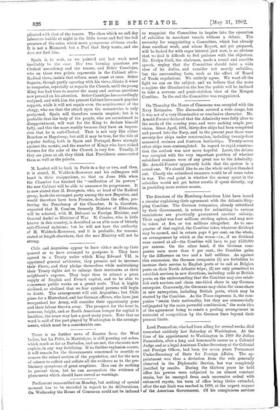Spain is to wait, as we pointed out last week
must inevitably be the case. Her two burning questions are Clerical ascendency and the tenure, and Senor Canalejas, who on those two points represents in the Cabinet ultra- Radical views, insists that reform must come at once. Senor Sagasta, though partly agreeing with his views, thinks it wiser to temporise, especially as regards the Church, until the young King has had time to master the many and serious questions now pressed on his attention. Senor Canalejas has accordingly resigned, and with him the present Cabinet loses much popular support, while it will not regain even the acquiescence of the clergy, who see that the attack upon the monasteries is only postponed. Spain will therefore remain unquiet; but it is probable that the body of the people, who are accustomed to disappointment, will wait for the King to declare himself fully, and this the more readily because they have an impres- sion that he is anti-Clerical. That is not very like either Bourbon or Hapsburg ; but still it may be true, for the tide of popular feeling, both in Spain and Portugal, flows strongly against the monks, and the number of Kings who have risked thrones for the sake of the Church is very few. Usually, if they are pious at all, they think that Providence consecrated them as well as the priests.










































 Previous page
Previous page